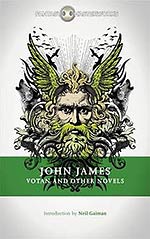
![]() Rhondak101
Rhondak101
1/13/2017
![]()
This collection contains three novels, Votan, Not For All the Gold in Ireland and Men Went to Cattreath. The Welsh novelist, John James, wrote primarily historical novels. These three, however, verge into the world of myth and fantasy.
The first two novels feature Photinus, a 2nd century Greek merchant, who, in his efforts to import northern luxury items back to "civilization," meets various characters and gods from Norse and Celtic myth. He even becomes a god himself. These novels are told in the first person by Photinus, who is a wry and entertaining narrator. He is often compared to George MacDonald Fraser's Flashman in reviews.
These two novels are meant to be humorous. Photinus delivers his lines with a wink and a nod, and the more the reader knows about Norse and Celtic myth, the more entertaining they are. Of the two, I enjoyed Not For All the Gold in Ireland the most. Votan seems too clever by half. Most of James' allusions and cameos in it are enjoyable, but sometimes he stretches a bit too far to wedge in one more myth or story in. Most reviewers also describe Votan as picaresque, which is a style that I do enjoy. However, I do think that the story does become a bit too disjointed at the end.
James structures Not For All the Gold in Ireland differently. It is clearly a quest myth that sprinkles in characters and stories from the Welsh Mabinogion and the Irish Tain. Its narrative is generally more clear, and James manipulates the characters and the myths to greater affect than he did in Votan.
James bases the last novel on the Welsh poem Y Gododdin, which is about the Battle of Cattreath which occurred between the Gododdin, a tribe of Celtic Britons, and the Angles who settled in the Eastern part of Britain. This battle took place around 600 AD after the Romans left Britain. The poem mostly elegizes the warriors from Gododdin who die in the battle. James creates a narrative from this that shows the preparations for the battle from the perspective of the bard Anernin, who is credited with the original poem. This somber piece is quite contemporary as it demonstrates the horrors of war and the dangers of demonizing others. The Gododdins call the Anglish settlers "Savages" throughout the book and do not try to understand that the way that the Angles live, as wheat farmers, is not wrong--just different. We all know that the Angles' way of life (along with that of the Saxons and the Jutes) ultimately prevails.
What I am most impressed with is James' ability to create historical worlds without resorting to clichés and formulae, which often occur in historical genre fiction. James wrote books set in several different time periods, including another novel set in Roman Britain as well as novels set in the 17th-19th centuries. I plan to add some of these to my reading list. However, I do recommend that you read something else between the novels in this book. At 700+ pages, James' first person narrative style can get monotonous.